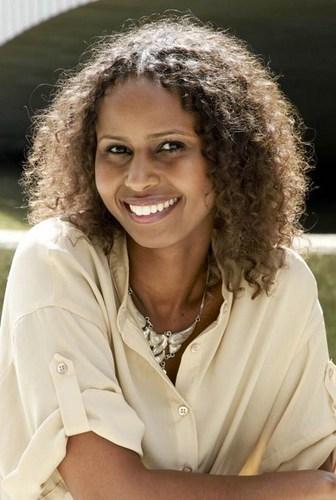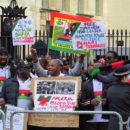An interview with Nadifa Mohamed: “I don’t feel bound by Somalia…but the stories that have really motivated me are from there” – By Magnus Taylor

Whilst most contemporary writing about Somalia focuses on the war, Mohamed’s recently published “˜The Orchard of Lost Souls’ is much more than just an account of violence and suffering.
Says Mohamed: “even if there’s a conflict people are still trying to live as normal lives as they can…despite the suffering that hits when the war breaks out, they are still pretending as far as they can that their lives are going to be the same as they expected them to be… people are not overwhelmed by conflict.”
To this end, Mohamed’s latest novel is a close-up portrayal of three women – Kawsa, Deqo and Filsan – whose lives intersect, diverge and then intersect again during a few weeks in 1987. It’s the eve of the Somali civil war and the rebels are closing in around Hargesia – the atmosphere is both febrile and yet, as Mohamed describes, profoundly normal.
Hargeisa was then something of a backwater in the larger Somali Republic ruled from cosmopolitan “Mogadishu the beautiful” with its “white-turbaned mosques, baskets of anchovies as bright as mercury [and] jazz.” Mohamed tells me that power was so concentrated in the capital that no building of more than 2 stories was permitted outside of Mogadishu – something that has made it such a political prize for those who have fought over it for the last 20 years.
But Mohamed speaks of Hargeisa with great affection, as a place in which she feels safer than in London. Indeed, Hargeisa is famous for its safe streets and low level of crime – money changers sit fearlessly behind huge piles of notes unprotected on the roadside and a gold market casually operates in the middle of town: “these feel like secrets, like secrets only people from those places know.”
Mohamed’s three main protagonists first meet in the city at a giant public rally on the anniversary of the country’s independence. The face of the President appears, Big Brother-like, constructed from placards held up by the crowd to become “a giant, a God who watches over them, who can dissolve into pieces and hear and see all that they do.” However, it’s what the state cannot control – the thoughts, feelings and personal relationships between ordinary people – that Mohamed is really interested in. Specifically, she wants to sink deeply into the minds of Somali people – so often overlooked as an undifferentiated mass of suffering and victimhood.
Kawsar – an old, rebellious widower – saves Deqo, a street girl, from a beating at the hands of a group of female government informers and enforcers (The Guddi). This results in Kawsar’s arrest by the police and subsequent beating after an interrogation by Filsan – a female soldier and daughter of a senior army officer – which leaves her bed-bound with a broken hip. Rather than becoming a story of the war, the book becomes a study of what goes on in the minds of these three characters.
Apart from a brief description of the fighting experienced by Filsan towards the end of the book, Mohamed seems to deliberately eschew the potentially dramatic episodes in the war. This could have included the levelling of Hargeisa by government planes or as Richard Dowden describes, the almost “biblical exodus”, when the entire remaining population of the city left and walked to Ethiopia. But Mohamed says this “would have drawn me away from what I really want to talk about – which was what was going on in people’s minds… I wanted [in this book] to sink deeply into a small thing.”
I ask Mohamed whether she will ever try to write a story from a different, non-Somali perspective: “My (personal) story starts in Somalia, so that’s where my books come from. But I don’t feel bound by Somalia…but the stories that have really motivated me are from there.”
She adds that “So many things are written about Somalis, but so few things are written by them…it also feels like an opportunity to set the record straight.” So in a sense Mohamed’s writing is political – an attempt to give a voice to those so infrequently portrayed in literature. And as she adds, it is “about discussing power and powerlessness…in a place that is seemingly always in flux, like Somalia, this becomes much more apparent.”
As one of a growing number of Somali diaspora writers, Mohamed enjoys the benefits of time, space and security that most of the current population of the country do not have. This perhaps explains why nowadays most of the best Somali literature is coming from outside the country.
But counter to plenty of conventional commentary, Mohamed doesn’t agree that the future of Somalia is in the hands of the diaspora:
“Diasporas can be quite dangerous”, she says “they can have quite a distorted view of their homeland. And they can come with a kind of sense of ownership – an almost colonial-type attitude.”
She also bemoans the fact that those sitting outside the country have “tried to say that there are just these big clans, and that’s who Somalia belongs to, and they’re all men and they’re all the same. But I don’t think they own Somalia – people like Kawsa own Somalia, people like Filsan’s maid. This is their home.”
In ‘The Orchard of Lost Souls’ Mohamed reminds us that amidst all the pain and suffering of war ordinary lives persist and not everyone is desperate to flee.
Magnus Taylor is Editor of African Arguments.







A writer shoud not feel that he or she is bounded by the environment that he surrounds but she is write when she says the stories that come from Somalia really motivated me.
My question and hope for her is that did she break that jinx of reaching wider appeal or audience than Somalis which many somali writes failed to get away from or did she succeed to bring out to the wider world that phenomena of Somali culture which is confined to its borders . she is among that dared
Hassan Jama
oslo norway